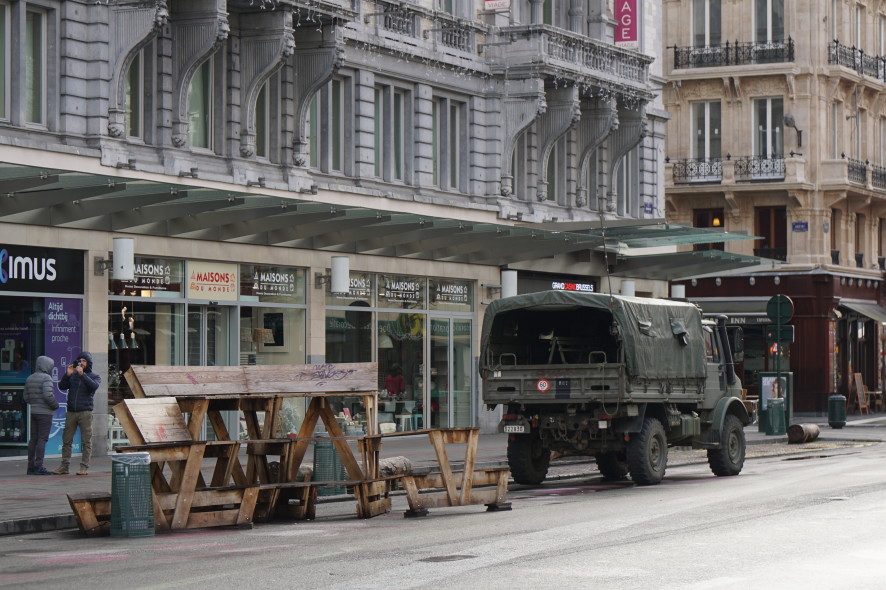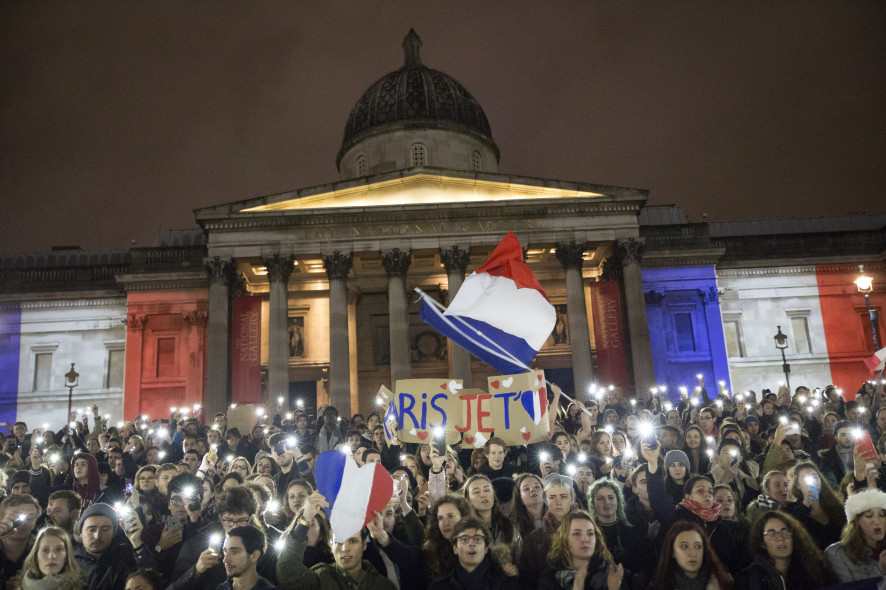On this dreary Tuesday morning, November 24th, the people of Brussels are yet again waking up to a city on lockdown. The metro, the central transport system that connects the city centre to the suburbs, remains closed, as too do the schools, universities, colleges and crèches of Belgium’s capital. Parents have no other choice but to stay home and mind the children, leaving offices understaffed or closed for the second business day. The boutiques lining the fashionable shopping avenues are not yet daring to un-shutter their windows, although yesterday the hastily scribbled notes of « exceptionellement fermé » were replaced with more sensible and typed signage, explaining that they would open later in the day for security reasons.
But, for what? Many curious friends and relatives have enquired about Brussels this weekend as the city descended- and remained – into lockdown, asking about the mood or the atmosphere in the city. Four days in, it is hard to explain. The streets are far quieter than before, some shops remain closed and people seem to hurry about their business. The presence of the military is both unnerving and comforting- while the sight of a heavy armed military makes some fear that something is about to happen around them, others have taken to getting their own “lockdown selfie” complete with a tank or soldier. The city feels safer with military patrols, but how long can this continue? The capital of Europe has been reduced to an effective ghost town, where soldiers often outnumber pedestrians on its streets and squares. Although it has been announced that the metro and schools will open tomorrow, Joelle Milquet, Minister for Education, Culture and Youth, suggested that schools should designate a safe room where staff and pupils can retreat to in the event of an emergency.
We still speak of a level 4 threat level, warning of “serious and imminent” threat of an attack, despite not knowing what caused the level to rise. The attacks on Paris naturally heightened tension across Europe, and many were horrified, though not necessarily surprised, to hear that Molenbeek had become a breeding ground for jihadists. The level was not raised, however, until early Saturday morning, a week after the attacks, and we still are unsure as to what excatly triggered this. Charles Michel, Prime Minister of Belgium, announced that terrorist groups had planned a similar attack on Brussels, and advised people not to congregate in groups and to avoid shopping centres, tourist attractions, travelling by metro. The first reaction is, of course, panic. But this panic has been quickly followed by confusion, and frustration. At the heart of this is the media’s, and indeed the government’s, tendency to hyper-dramatize the events that are going on around us, without properly explaining the reasons behind the orders they give.
People are becoming more and more impatient with the lockdown. When friends and I learned that the level 4 warning was staying in place for another week, we did not resign ourselves to another week of caution and vigilance. Instead, we expressed frustration and annoyance that our lives could so easily be disrupted by something in the unknown.
Of course, it is not the enemy unknown that we should fear, but the enemy within. We must rationalise and think of what we know: there is a serious threat that Brussels will be hit by a terrorist attack. This threat was present before the atrocities of Paris, and will be there tomorrow. We live in a world where Western values and our modern, liberal and free society represent all that is wrong to violent and cruel terrorists. Some of these terrorists live among us, some preach hate to indoctrinate European youth. They do not represent the totality of any group, and to persecute or target any demographic even vaguely associated with them would simply strengthen their case.
The threat is omnipresent, and it is disconcerting to think that such evil is in our midst.
If the media continue to present the threat as existing only when the level is raised, however, they do both themselves and the public a great disservice. The Belgian government runs the risk of becoming the boy who cried wolf if they persist in raising and lowering the threat level without properly communicating the reasons for such measures with the public. The public understands the need for “radio silence” while the police continue their operations, and appreciates this necessity. We know that there are some things the public cannot, and should not, know. But, by extending this period of public ignorance, the police, government and media run the risk of doing more harm than good.
Unless it is sufficiently explained, there is a risk of the vacuum opening for speculation, to be filled with unsubstantiated reports, suspicion, and worse of all, hate for the immigrant communities, certain disadvantaged areas of the city, and/or the Muslim population. Perhaps a more serious and imminent threat is that the people of Brussels will in the future ignore warnings like the one received this week. Should les Bruxellois become immune to government warnings, this could leave the city even more exposed to attacks.
This whole exercise in confusion could develop into something far more dangerous than the threat we are supposedly under this week in Brussels. In reality, we need to accept that the threat will live among us always, and adopt vigilance and caution into our lives without allowing it to impede our enjoyment. So, with that, let’s tweet a few more cat pictures, shall we?
Picture by Miguel Discart, taken from flickr.





